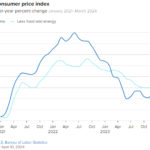Utility companies will pay less tax from a recent tax overhaul, and many are planning to pass those savings on to customers. Rate changes may shave a few dollars off the average customer’s bill in the coming months, The Wall Street Journal reports.
The federal government slashed its corporate tax rate from 35 percent to 21 percent. Regulated gas and electric utilities will have to pay less tax, and some state authorities may give regulated utilities little choice but to return that tax savings to its customers, WSJ reports.
Some regulated utilities will be refunding some of the tax payments they collected from customers based on the 35 percent rate. Companies may choose to issue refunds over several years, so the savings may be minimal for customers.
For example, National Grid U.S., a utility holding company with subsidiaries in New York, Massachusetts, and Rhode Island, expects a non-cash tax credit of $2 billion in 2018 from the lower tax rate. “It’s going to be returned to customers over a period of 20 to 30 years,” Peggy Smyth, the company’s finance chief, told The Wall Street Journal.
Some companies are using the tax savings to defray higher costs and prevent having to hike bills. For example, Florida Power & Light said it plans to use its savings to pay for $1.3 billion in recovery costs from Hurricane Irma. Customers may not see any reduction in utility bills, but it will spare them from any increases, the company said.
Duke Energy Corp, with subsidiaries in North Carolina, is in the process of requesting permission from local authorities to cut retail rates or use its tax savings to defray the cost of storm-related recovery efforts, WSJ reports.
“Tax reform has presented us a unique opportunity to reduce customer bills in the near term, while also helping to offset future rate increases,” says Steven Young, Duke Energy’s finance chief.
Source: “As Utilities Move to Pass Tax Savings to Customers, Credit Concerns Arise,” The Wall Street Journal (Feb. 7, 2018)











